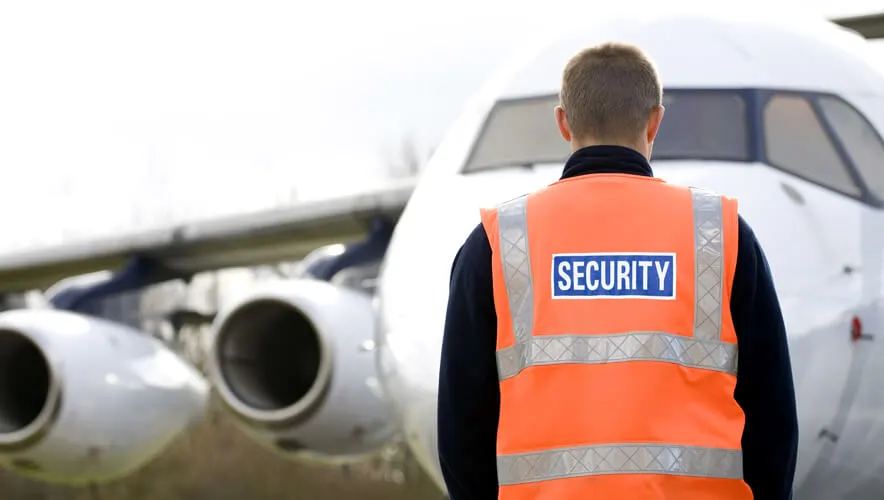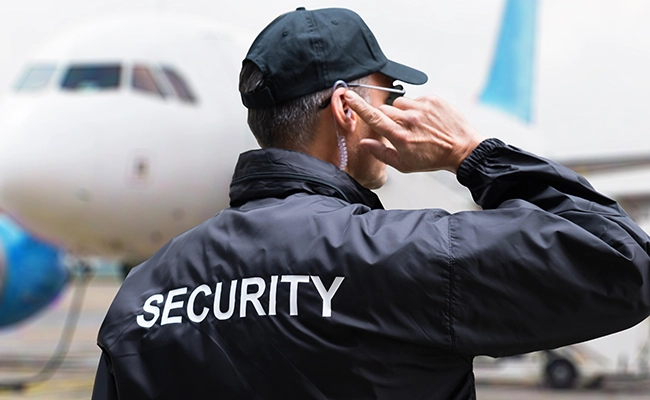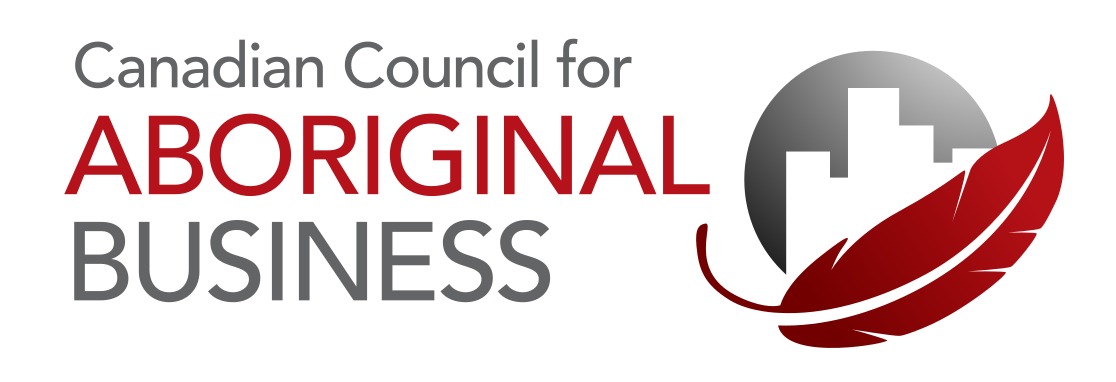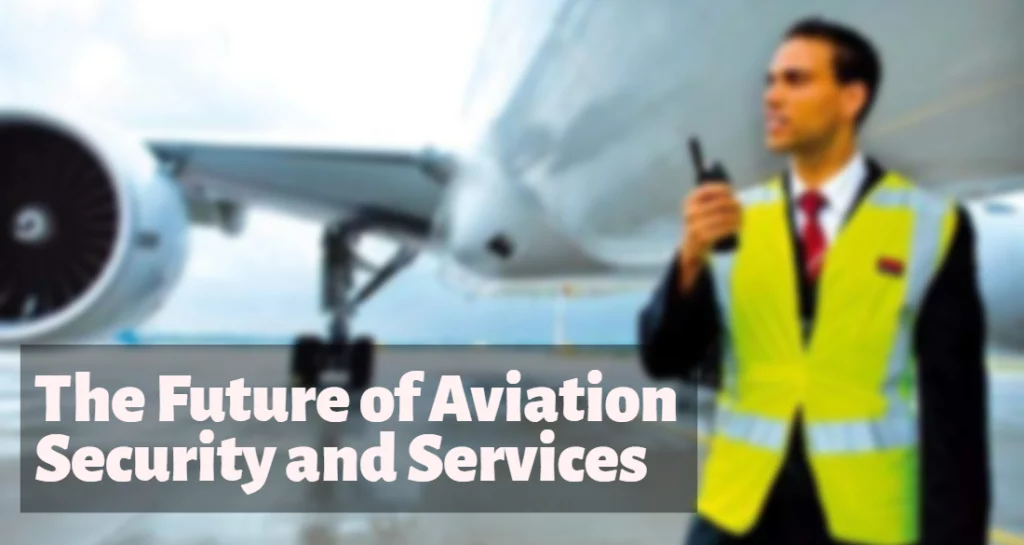With the development of mankind, people started traveling through different means from carts to cars, trains to bullet trains, and planes to jet planes. All the revolutions have revealed great time management and people are now traveling around the globe. There come great challenges for aviation security services to manage each and every process of transit, boarding, and customer satisfaction. Aviation security companies play a vital role in resolving issues like mismanagement in airlines, airports, and governments worldwide. In recent years, there have been substantial advancements in technology that have enhanced the aviation security services in place.
Moreover, with the elevating threat of terrorism and other security concerns, it is vital to look toward the future of aviation security companies and explore what further advancements can be made. One of the primary trials in aviation security is striking a balance between security and convenience. Event security guards that are too strict can cause long wait times and troublesomeness for passengers, while trials that are too sloppy can put customers and crew members in danger. Thus, the future of aviation security lies in finding a way to attack this balance.
Importance of Aviation Security for Future Growth
The aviation industry has undergone a significant revolution in recent years, with the evolution of low-cost carriers, advances in technology, and new routes. Though, one of the most serious aspects of the aviation industry that should not be ignored is aviation security.
First and foremost, aviation security services are crucial to ensure the safety of passengers and crew members. In the past, aviation security was mainly focused on hijacking anticipation, but the events of September 11, 2001, showed that aviation security companies needed to be reevaluated and strengthened. Since then, substantial efforts have been made to improve aviation security through the enactment of new technologies, training, and trials.
In addition to certifying safety, aviation security company is also vital for the growth and sustainability of the aviation industry. The worldwide aviation industry creates significant economic benefits, backup millions of jobs and donating billions of dollars to the global economy. However, an important security incident can have a simple impact on the industry, leading to a loss of public self-assurance and decreased demand for air travel.
Furthermore, aviation security services are not only necessary to prevent potential terrorist attacks but also to defend against other threats such as cyberattacks and smuggling. With the growing reliance on technology in the aviation industry, the hazard of cyberattacks on aircraft systems and substructures has grown. Thus, aviation security wants to include cybersecurity measures to avert such attacks and safeguard serious information.
Lastly, the COVID-19 pandemic has emphasized the importance of aviation security services in managing public health perils. Aviation security companies can help prevent the spread of transmissible infections, such as screening passengers for symptoms, applying disinfection procedures, and imposing social distancing. These trials are crucial in reestablishing public confidence in air travel and guaranteeing the safety of passengers and crew members.
Potential Developments to Shape the Future of aviation security
- Biometric Identification
Biometric identification is previously being used in some airports, and this drift is likely to continue. It can include facial recognition and fingerprint technology, which can suggestively speed up the security screening procedure while also making it more protected. With biometric identification, travelers can be quickly and accurately identified, making the cycle of getting through security checkpoints faster and more efficient. The best Aviation Security Services involve biometric identification to use of unique physical or behavioral characteristics to recognize individuals. Biometric data such as facial recognition, fingerprints, iris scans, and voice recognition can be used to validate a passenger’s identity, permitting them to move through airport security and boarding processes flawlessly. Here’s how biometric identification improves to the future of aviation security:

- Increases Security: Outdated methods of passenger verification such as boarding passes, passports, and IDs are vulnerable to fraud and identity theft. Aviation security company offers biometric identification processes to create a more secure method of passenger verification that cannot be easily employed. By using biometric technology, airports can confirm a passenger’s identity more precisely and reduce the likelihood of unauthorized access to limited areas.
- Improves Efficiency: This streamlines airport processes, making them more efficient. With the application of biometric technology, airlines can check travelers in more quickly, validate their identities, and board them onto their flights impeccably. This decreases delays and improves on-time performance, which is vital for both airlines and passengers.
- Improves Passenger Experience: It enhances the passenger experience by making airport processes more continuous and hassle-free. Passengers can transfer through airport security and lodging processes without having to juggle multiple documents recurrently. This decreases stress and anxiety, allowing passengers to have a more enjoyable travel experience.
- Reduces Wait Times: Aviation security services in Toronto reduce the long queues and wait times at airports and acts as a significant relief of frustration for travelers. Biometric identification decreases wait times by mechanizing the check-in, security, and boarding procedures. Passengers can rapidly move through security checkpoints without having to display their boarding passes or IDs recurrently. This saves time and decreases stress, improving the overall airport experience.
- Enables Contactless Travel: With the ongoing COVID-19 pandemic, contactless travel has become a topmost priority for airlines and passengers. Biometric identification permits contactless travel by eradicating the need for physical documents and dropping human-to-human contact during the check-in, security, and boarding processes. This creates air travel safer and more suitable for passengers.
- Artificial Intelligence
Artificial intelligence (AI) can be used to evaluate passenger behavior, identify suspicious activity, and perceive potential threats. AI algorithms can be employed to analyze passenger data, such as purchasing habits, travel patterns, and social media activity, to recognize potential security risks. AI can also be used to supervise airport surveillance cameras and identify uncommon behavior or activity under the supervision of an aviation security company.
AI-powered arrangements can analyze vast amounts of data and offer real-time insights that can support enhance aviation security trials. Let’s discuss how AI is transforming the future of aviation security:
- Identifying Potential Threats: Landing fields and airlines face several threats, including terrorism, human trafficking, and smuggling. AI-powered systems can help recognize potential threats by analyzing passenger data, including criminal records, travel history, and other relevant information. This data can be employed to flag passengers who may pose a security risk, aviation Security Guards Edmonton allows authorities to conduct additional screening and avert potential threats from boarding flights.
- Improving Screening Procedures: Airport security services serve screenings that are serious to ensuring passenger safety, but they can be arduous and offensive. AI-powered systems can improve screening procedures by systematizing the process and identifying impending threats more efficiently. AI-powered scanners can perceive hidden weapons and explosives, dropping the need for manual pat-downs and increasing the accuracy of screenings.
- Real-time Monitoring: Such systems can monitor airport terminals and aircraft by alerting security personnel to potential security breaches or doubtful behavior in real time. AI-powered cameras can detect unattended bags, alerting authorities, of suspicious activity, and permitting them to respond quickly.
- Analytical Maintenance: AI-powered arrangements can also help ensure the safety of aircraft by foreseeing maintenance issues before they developed major problems. By examining data from sensors and other sources, the best aviation security services can identify potential maintenance issues and be aware of maintenance personnel, allowing them to address the problem before it causes an accident.
- Refining Operational Efficiency: aviation security systems can also improve operational efficiency in the aviation industry, dropping delays and enhancing the passenger experience. AI-powered algorithms can improve flight schedules and reduce congestion, gate assignments, and refine on-time performance.
- Advanced Scanning Technology
The emergence of advanced scanning technology can provide more correct and detailed images of travelers and their belongings. This technology can comprise 3D scanning and enhanced X-ray machines, which can perceive hidden objects and explosives that may not be noticeable with traditional scanners. Such technology can increase the effectiveness of security screenings while also decreasing wait times and growing convenience for passengers.
The best aviation security services have the potential to revolutionize aviation security by offering more precise, effective, and non-invasive methods of screening passengers and luggage.
- Body scanners: These are one of the most significant advances in aviation security technology in recent years. These apparatuses use millimeter-wave technology or backscatter X-ray technology to generate an image of a person’s body, highlighting any items or weapons that may be concealed underneath clothing. Dissimilar to traditional metal detectors, body scanners are non-invasive and can sense non-metallic objects, comprising plastic explosives and ceramic daggers. Furthermore, the images produced by body scanners are examined by computers rather than by aviation Security Guards Edmonton, reducing the risk of secrecy violations and favoritism.
- Explosive trace detection: It is a technology that can perceive minute amounts of explosive residue on an individual’s belongings or clothing. This technology uses numerous methods, including mass spectrometry and ion mobility spectrometry, to detect trace amounts of explosive deposits. It is extremely correct and can detect a wide range of explosive resources, including those that are non-metallic and hard to detect with traditional screening approaches.
- Automated screening lanes: These are examples of advanced scanning technology that is enlightening airport security. These lanes employ a series of automated bins, conveyor belts, and scanners to move travelers and their belongings through the screening course quickly and efficiently. The use of automated screening lanes decreases the risk of human error, elevates the screening process, and delivers a more unified travel experience for passengers.
- Cargo screening: Lastly, advanced scanning technology is also being established to screen cargo more efficiently. Outdated methods of cargo screening involve X-ray scanning and physical inspections, which can be time-consuming and incompetent. Newer technologies including computed tomography scanning and neutron radiography, can offer more accurate and effectual methods of cargo screening, dropping the risk of trafficking and terrorism.

- Cybersecurity
Airlines and airports become more connected and reliant on technology thus making them vulnerable to cybersecurity. The aviation security company must develop robust cybersecurity trials to protect against cyber threats, such as data breaches and hacking. Certifying the security of critical infrastructure and delicate information is essential for preserving the safety and sanctuary of the aviation industry.
- Safety from cyber threats: With the growing use of technology in the aviation industry, the threat of cyber-attacks has become an important concern. A cyber-attack can possibly compromise the safety and security of the aviation security system by stealing sensitive information, disrupting flight operations, or even causing physical damage to aircraft. The best aviation security services take measures that can protect against these threats by perceiving, preventing, and responding to cyber-attacks.
- Protect critical infrastructure: The aviation industry depends heavily on critical infrastructure, including navigation systems, air traffic control systems, and airport operations. Cybersecurity trials can protect this substructure from cyber threats, certifying the continual functioning of the aviation system. This can improve aviation security by falling the risk of disruptions caused by cyber-attacks.
- Stopping unauthorized access: Cybersecurity trials can prevent unauthorized access to serious aviation systems and data. This can avert hackers and other malicious actors from acquiring access to sensitive information or handling aviation systems for nefarious purposes. Aviation security company Toronto helps in preventing unauthorized access, cybersecurity trials can enhance aviation security by certifying that only authorized personnel have entree to critical aviation systems.
- Improving situational awareness: Cybersecurity trials can provide real-time situational awareness of cyber intimidations to aviation systems. This can permit an aviation security guard to respond quickly and efficiently to cyber-attacks, lessening the potential influence of such attacks on aviation security. By improving situational awareness, cybersecurity trials can help to prevent cyber threats from becoming aviation security intimidations.
- The partnership between stakeholders: Cybersecurity aviation security services require partnerships between various stakeholders in the aviation industry, including airports, airlines, regulators, and cybersecurity specialists. This collaboration can support to create a more complete and effective cybersecurity framework that improves overall aviation security. By functioning together, stakeholders can recognize and alleviate potential cyber threats, enlightening the overall resilience of the aviation security system in Toronto.
- Drones and Unmanned Aerial Vehicles
Drones and unmanned aerial vehicles are becoming more widespread, and this boon is a potential Security Guard Company Edmonton risk to airports and airlines. The employment of drones near airports can interrupt flight operations and stance a risk to aircraft. To battle this threat, the aviation security company must develop technology that can perceive and neutralize drones in the airspace adjacent airports.
Drones and UAVs have become progressively popular over the past few years, particularly in the field of aviation security. These tools are being used to improve security measures and increase safety in airports and other aviation-related surroundings.
- Surveillance and Monitoring: One of the prime uses of drones and UAVs in aviation security is for scrutiny and monitoring. These tools are equipped with high-definition cameras that can capture high-quality pictures and videos of the surroundings. They can be employed to monitor the movements of people, vehicles, and aircraft in and nearby airports. They can also be used to perceive any suspicious activity or conduct that could pose a security threat.
- Search and Rescue: Such tools can also be used for search and saving operations in aviation-related surroundings. Aviation security services can be used to search for lost aircraft or to trace people who may have been hurt or lost in remote areas. Such technologies can cover large areas rapidly and efficiently, which can support saving time and resources.
- Inspection and Maintenance: Such technologies are also being used for inspection and maintenance resolutions. They can be used to examine runways, taxiways, and other airport organizations for any signs of damage or wear and tear. They can also be employed to inspect aircraft for any defects or breakdowns before takeoff.
- Future Innovations: As technology continues to grow, we can expect to see even more developments in drone and UAV technology that will add to aviation security. There are already tactics to develop sovereign drones that can make verdicts on their own, without human involvement. Such technology could be used to monitor and return to security threats more quickly than ever before.
Central Protection Services is a Canadian-based security company offering services for the new world’s challenges. Our offices are in Edmonton, Calgary, Alberta Wide, Airdire, and allied regions. We offer technological systems and aviation security guards for airspace sectors. Get the quote for technologically advanced aviation security solutions for cannabis security for dispensaries in Edmonton.


